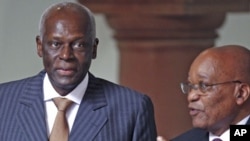The gradual collapse of the Soviet Union, which ended in dissolution 20 years ago, had wide-ranging effects across Africa. Marxist-inspired governments and movements lost their backers, while new conflicts became awash with weapons and mercenaries from the former Soviet sphere.
During the Cold War, described by many analysts as a geographical chess game between the Soviet Union and the United States to either spread the socialist system or prevent it, Africa was not immune from its fallout.
Angola's internal strife
Angola is one example of how the situation sometimes became a protracted civil war.
The winners of the war in Angola, and rulers since independence from Portugal in 1975, were the Soviet-backed People's Movement for the Liberation of Angola.
But when Soviet-backed Cuban troops pulled out completely in 1991, and the Soviet Union stopped sending weapons and aid, Angola's government renounced Marxism and adopted free market policies.
An Angolan author and journalist with the newspaper Semanario Angolense, Sousa Jamba, said the change away from socialist ideology was very abrupt and was never explained.
"They were very ardent Marxists at one time, and when the Soviet Union collapsed all they said was, 'we also have to do away with Marxism.' And my question was, were they Marxists because they believed in the ideology or were they Marxists because it was convenient at one point to be Marxist in order to get the backing from the Soviet Union? That question has not been answered,” said Jamba.
Ripple effect
In other countries, like Ethiopia, when the Soviet Union stopped backing the government, rulers were quickly ousted. Other Soviet-backed leaders, such as Benin's Mathieu Kerekou, renounced Marxism and then lost multi-party elections.
U.S. and European backed anti-communist authoritarian governments also slowly turned to multi-party elections.
A professor of politics at Princeton University from Benin, Leonard Wantchekon, said multi-party democracy was an improvement, but also for many Africans a disappointment.
“Disappointed not in the elections per say, but disappointment in how little elections changed governance and development outcomes,” said Wantchekon.
The collapse of the Soviet Union in Africa also was followed by the loss of influence of Soviet-educated opposition activists and government workers, a wave of privatizations, and increased reliance on foreign aid agencies to provide basic services. According to Jamba, the Angolan journalist, there also has been deteriorating governance.
"In some of these countries what we have is just the worst kind of capitalism, in which people use the state to steal money and steal the resources of the country," said Jamba.
Weapons proliferation
Besides Angola, the Cold War coincided with other black liberation movements, some of them also violent and resulting in civil war, and in southern Africa, with anti-communist white minority governments resisting for years.
A Senegalese historian with the College of Wooster, Ibra Sene said while most of those struggles ended along with the Cold War, there were very negative residual effects as well.
“At the end of those wars there was a big pile of weapons that was circulating around the continent and playing a very important role in areas where there were new wars. It is a huge problem after the Soviet Union,” said Sene.
With many former Soviet soldiers and pilots out of work, some of them became mercenaries operating old Soviet equipment in recent West African conflicts, such as in Ivory Coast or in Liberia.
Other conflicts, such as those ongoing in the eastern Democratic Republic of Congo and in Somalia, are still awash with weapons from the Cold War fighting, or obtained more recently from Soviet Union stockpiles, highlighting how the former world power’s collapse is still being felt to this day in Africa.
Soviet Union's Collapse Two Decades Ago Deeply Affected Africa




